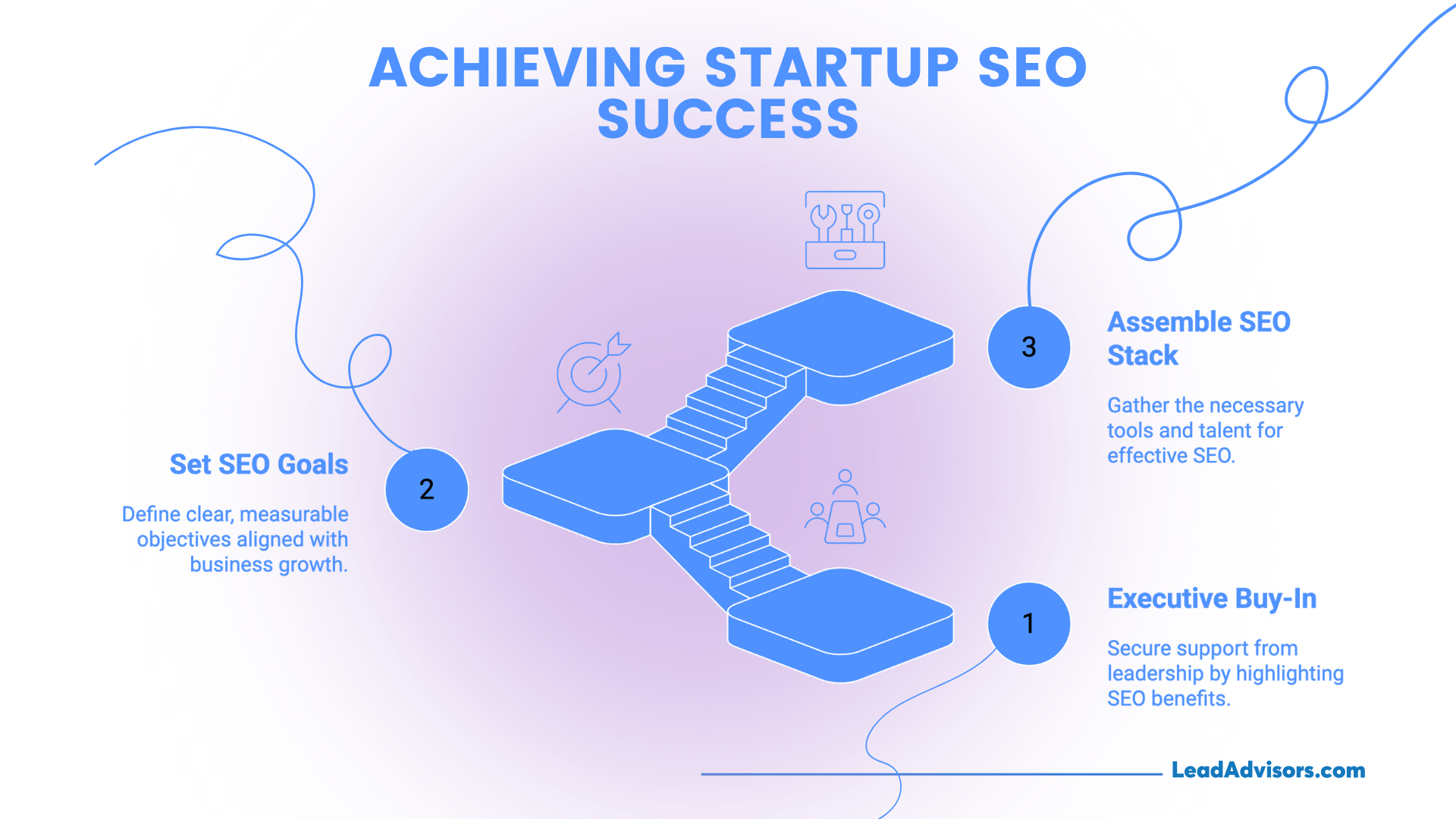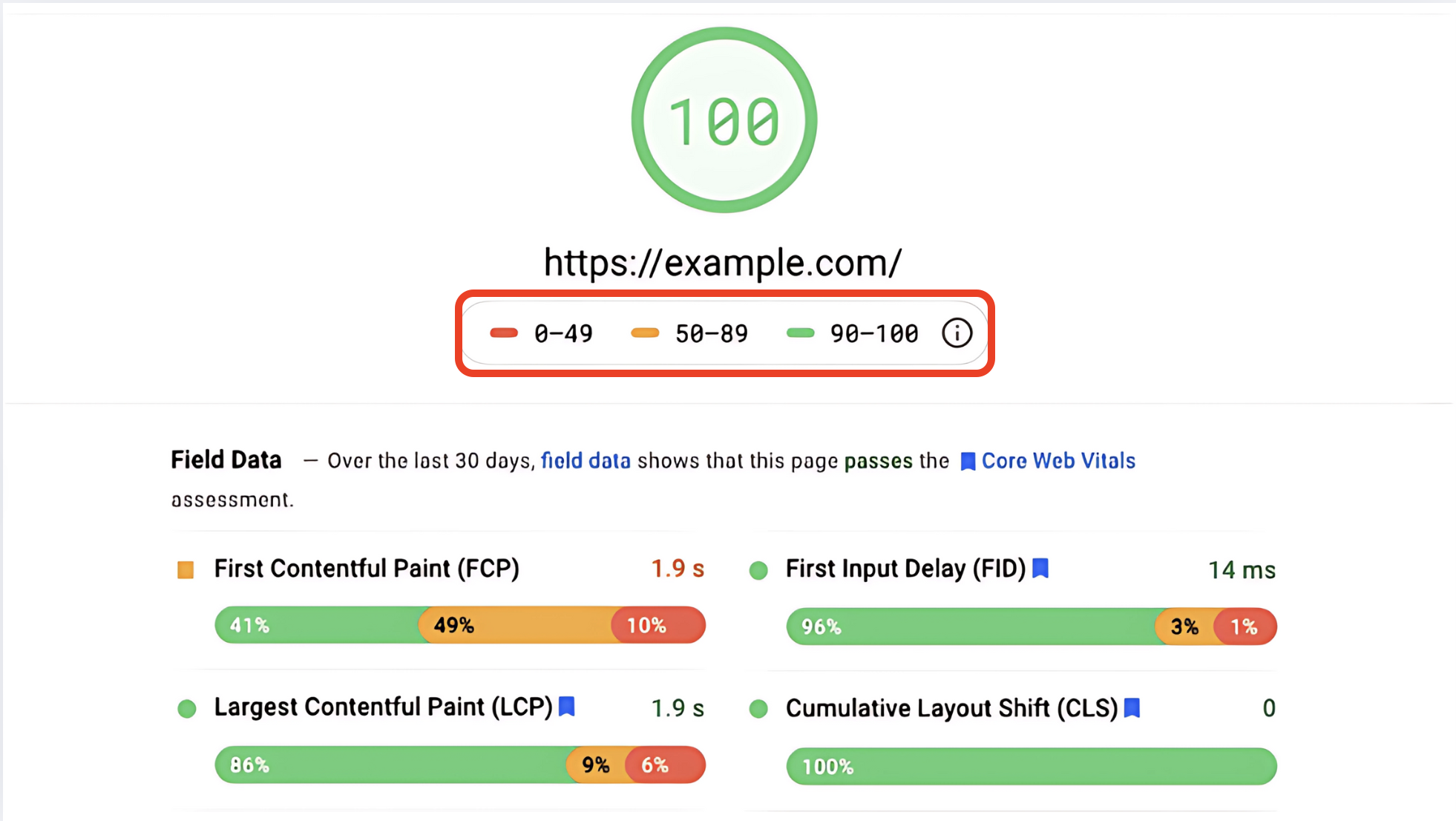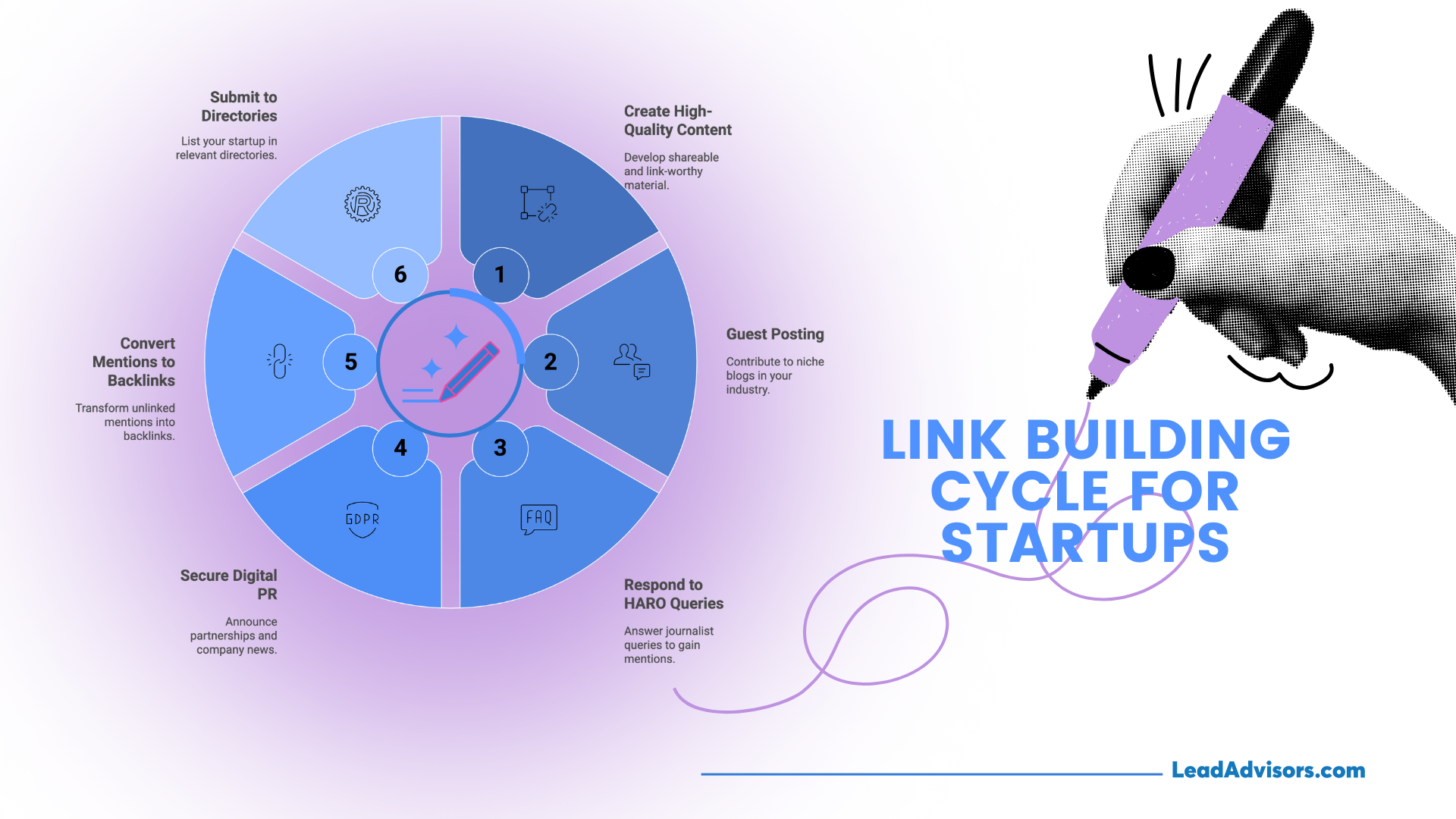In 2025, with over 300 million startups launched each year, visibility is survival. SEO for Startups is the most reliable, compounding growth tool available.
The numbers don’t lie: the average ROI of SEO is 748% – $7.48 back for every dollar spent. Organic search drives 52% of all web traffic, crushing paid (5%) and social (6.5%).
If done right, SEO also cuts customer acquisition costs by 60%. Far from being “dead” or only for big brands, SEO for Startups helps lean teams outshine giants through search intent, quality content, and user trust. This guide shows you how.
Why SEO Is a Startup Growth Multiplier
The Compounding Power of Organic Search
Paid ads may bring quick wins, but traffic stops the moment the budget does.
In contrast, SEO for startups creates lasting growth. Ranked content keeps driving visitors without added cost per click and delivers conversion rates 14.6% higher than other channels. Because it supports the entire customer journey from awareness to decision, SEO builds both trust and authority.
Unlike PPC, which disappears overnight, SEO compounds over time, ensuring steady visibility, reduced customer acquisition costs, and long-term growth that even lean startups can depend on.
When to Invest in SEO (Startup Lifecycle Fit)
If you haven’t reached product–market fit, hold off on SEO. But once traction is in place and someone can own the strategy – even if it’s just you – it’s time to start.
Smart SEO for startups means focusing on channels your users already search and tracking impact with tools like Google Search Console and Google Analytics. It’s not about chasing every keyword or the largest audience; it’s about targeting the right search terms that match your stage, audience, and growth goals.
Startup SEO Strategy Blueprint

Get Executive Buy-In
To make SEO for startups succeed, it must first be sold internally – especially to leadership. Skip jargon and focus on outcomes they care about:
- Traffic growth
- Qualified leads
- Brand visibility
- Lower CAC
Explain SEO simply as:
- Attract: Drive visitors through organic search
- Engage: Provide relevant, helpful content.
- Convert: Build trust that leads to action.
Compared to ads or cold outreach, SEO delivers lasting visibility and trust at a lower cost, embedding your brand directly into search results where it matters most.
Set Smart, Startup-Relevant SEO Goals
SEO without goals? That’s just guessing. No matter whether you’re operating a SaaS, E-commerce, or brick-and-mortar store, your aims for SEO should be to match growth directly:
- More organic traffic
- Higher keyword rankings
- Increased conversions
- Better domain authority over time
Concentrate on demo signups for SaaS. Consider product page traffic for eCommerce. Quality leads and form submissions are more critical for B2B. I monitor my KPIs in Google Analytics 4 (GA4), Looker Studio, Google Search Console, and other tools such as Ahrefs or Semrush, which make goal monitoring a cinch.
Assemble Your SEO Stack
SEO for startups doesn’t demand a large team – just the right tools and talent. Depending on your budget, you can upgrade your in-house skills, hire freelancers, or partner with an SEO agency. A solid stack should include:
- Flexible CMS (WordPress, Webflow)
- Keyword research tools for low-competition terms
- Technical SEO audit tool
- AI writer for quick drafts (human-edited)
- Analytics (Google Analytics or Looker Studio)
With ~$500/month, invest in DIY tools and a freelancer. With ~$5,000, layer in audits, content, and link building. Focus spending where SEO drives measurable growth.
Laying the Technical SEO Foundation
Build an SEO-Friendly Website

Before diving into keyword research, startups must ensure their website is technically ready for search. A strong foundation improves visibility even before content scales. Key steps include:
- Flat Site Architecture: Keep pages within a few clicks from the homepage.
- Smart Internal Linking: Guide both users and crawlers, reducing crawl depth.
- Technical Essentials:
- Clean robots.txt
- Updated XML sitemaps
- Correct canonical URLs
- HTTPS security
- Mobile-friendly design
- Optimized Core Web Vitals for speed
These aren’t minor tweaks – they’re critical signals that help search engines index and prioritize your site.
Run a Technical SEO Audit
For SEO for startups, regular technical audits are essential to prevent hidden issues that hurt rankings. Tools like Google Search Console, Semrush, and Screaming Frog help detect problems early. Focus on fixing:
- Broken links (impact UX and crawlability)
- 404 errors
- Duplicate content
- Redirect chains that slow down performance.
Frequent health checkups keep your site stable and visible. Remember: a strong backend is the foundation of SEO – without it, even great content and backlinks won’t deliver lasting results.
Keyword Strategy for Lean Teams
Research Keywords That Actually Convert
For SEO for startups, every keyword must count, especially with limited time and budget. The focus should be on terms that attract visitors and match search intent.
- Informational keywords build awareness, e.g., “What is technical SEO?”
- Transactional keywords drive action, e.g., “Best SEO tools for startups.”
Small teams should aim for low-competition keywords with strong business potential – search terms their audience is actively using and where they can realistically rank.
Tools like Semrush Keyword Magic Tool, Google Keyword Planner, and AnswerThePublic make it easier to find these opportunities. When paired with content that solves real problems, these keywords turn into growth drivers.
Analyze the Competition (Keyword Gap & Win Opportunities)
When it comes to SEO for startups, competing for the exact crowded keywords isn’t always the best move. Instead, focus on smarter keyword strategies:
- Keyword Gap Analysis: Use tools like Semrush to find keywords your competitors rank for but you don’t.
- Content Advantage: Look beyond rankings – spot where competitor content is weak and add more value.
- Branded vs. Non-Branded: Ranking for your name is easy, but real growth comes from non-branded searches (e.g., “affordable CRM for startups”).
- Quality Over Quantity: Ten well-chosen, intent-driven keywords can drive stronger results than thousands of weak ones.
Content That Ranks and Converts
Build Content That Solves Problems, Not Just Ranks
Effective SEO for startups isn’t about churning out content stuffed with keywords – it’s about solving real problems.
When your articles align with search intent, whether informational or transactional, you transform casual visitors into potential customers. Clear formatting with headlines, bullets, visuals, and concise paragraphs makes content easy to scan, while tools like Surfer, ContentShake, or Hemingway help refine long-form posts for both readers and search engines.
By delivering fast, practical answers instead of fluff, you build trust, authority, and sales – ensuring your content ranks well while genuinely serving your audience’s needs.
Create Topic Clusters to Build Authority
Looking to rank for more than just one specific keyword? Think like a librarian. Group your content by topic clusters.
Here’s how:
- Write one strong pillar page on a broad topic (like “SEO for Startups”)
- Then support it with related cluster content, each focused on a specific long-tail keyword.
- Use smart internal links to connect everything.
This tells search engines in depth that you’re an authority on the topic and can increase your domain authority over time. You can also leverage AI tools and topical maps to create scalable clusters that mimic what your audience is currently searching for.
It is not only about ranking for some specific terms, but it is becoming the go-to resource.
Refresh and Reoptimize Regularly
For SEO for startups, success isn’t “set it and forget it.” Regular reoptimization keeps content competitive and traffic flowing. Easy wins include:
- Quarterly Audits: Update headlines, meta descriptions, stats, and internal links.
- Match Fresh Intent: Revise content to align with changing user needs.
- Fix Technical Issues: Compress images, resolve broken links, and clean duplicate content.
Even small tweaks can lift rankings and organic traffic. By consistently refreshing old content, startups gain faster growth without always creating from scratch.
Link Building Without Spam
How Startups Should Think About Backlinks
SEO for startups often hinges on backlinks, which act as trust signals for search engines. Quality links from reputable sites boost domain authority and rankings far more than sheer volume. Key points to remember:
- Backlinks = Votes of Confidence: External sites linking to you signal credibility.
- Quality Over Quantity: A handful of strong links from trusted sources beats thousands of weak ones.
- Avoid Spammy Farms: Low-quality links can harm more than help.
For startups, smart backlink strategies can level the playing field against larger competitors.
Proven Link Building Tactics for Startups

You don’t need to be a PR pro to earn quality backlinks.
Startups can build authority with lean but effective tactics such as guest posting on niche blogs, responding to journalist queries through HARO, leveraging company announcements for digital PR, turning unlinked mentions into backlinks, submitting to directories like Crunchbase or Product Hunt, and creating original, link-worthy content like industry studies or calculators.
The key is publishing material that’s valuable enough to be shared naturally, making backlinks a compounding growth driver for your SEO.
Leverage Affiliate Editorial Reviews to Earn Authority at Scale
One powerful yet underused SEO tactic for startups is securing placements in affiliate editorial reviews. These aren’t testimonials – they’re curated brand mentions that deliver both authority and conversions. Common formats include:
- “Best [your niche] products” listicles
- Evergreen buyer’s guides
- Niche gift guides
- Product spotlights and brand reviews
These features provide premium backlinks, improve domain authority, and attract pre-qualified traffic ready to buy. Startups across industries – from DTC to SaaS – are doubling sales with just a few high-value mentions.
With agencies like LeadAdvisors handling affiliate placements, link building becomes a predictable, scalable growth engine.
Local & International SEO (If Applicable)
Local SEO for Brick-and-Mortar Startups
For location-based startups, local SEO can be a game-changer by capturing nearby customers at the moment they search. Key actions include:
- Optimize Google Business Profile: Keep info, photos, hours, and services current.
- Maintain Consistent NAP: Ensure Name, Address, and Phone are uniform across all directories.
- Publish Local Content: Create city- or region-specific posts and landing pages.
- Earn Local Reviews: Boost trust and local rankings with customer feedback.
- Build Local Links: Gain backlinks from community blogs, press, or organizations.
Done right, local SEO helps startups dominate search in their backyard.
International SEO for Global Startups
International SEO for Startups requires adapting the strategy for global reach. Key steps include:
- Site Structure: Choose between ccTLDs, subfolders (e.g., /UK/), or subdomains – prioritize clarity and scalability.
- Hreflang Tags: Signal to search engines which content version to serve by language or region.
- Localized Content: Create language- and culture-specific content instead of direct translations.
- Fresh Keyword Research: Redo keyword analysis for each market, since search intent and metrics differ.
Though complex, international SEO pays off with stronger visibility, trust, and traction across multiple regions.
Measure, Report, and Iterate
Set Up a Lean SEO Reporting Framework
A lean SEO for startups reporting framework focuses less on pageviews and more on what traffic actually delivers. Instead of celebrating vanity metrics, measure leads, signups, demo requests, and revenue impact.
Tools like Looker Studio can help visualize traffic trends, keyword performance, and conversions, while Semrush’s Position Tracker monitors rankings over time. To strengthen reporting, integrate SEO data with CRM and marketing platforms so every click, visit, and keyword can be tied directly to business outcomes.
This ensures your SEO efforts are always linked to real growth, not just noise.
How to Communicate Results to Stakeholders
When reporting SEO for startups’ results, remember that not all stakeholders care about rankings or traffic charts. Use simple scorecards that highlight:
- Search engine visibility
- Rankings for target keywords
- Growth in domain authority
- Conversions tied to SEO pages
Pair the data with a clear story: emphasize short-term wins like new backlinks or ranking jumps and long-term gains such as reduced CAC and consistent organic visibility. This builds trust and keeps leadership engaged, and once results compound, you won’t need to “pitch” SEO again – it will sell itself.
Scaling SEO as You Grow
When and How to Scale Content Ops
Once SEO for startups shows early wins, the next step is scaling content operations. This means creating a repeatable system instead of relying on just yourself or one freelancer. You can:
- Build an internal SEO content team
- Partner with freelancers or an SEO agency
The key is process: Document SOPs for keyword research, briefs, writing, reviews, and publishing. Pair this with an editorial calendar and topical map to stay strategic. This shift will take you from a few strong posts to a scalable, predictable content engine that drives consistent growth.
SEO + PPC + AI: The Hybrid Stack for Modern Startups
Modern SEO for startups works best when combined with PPC and AI. This hybrid stack lets you scale faster and smarter:
- SEO + PPC: Use Google Ads to test high-converting landing pages, then invest in organic content that compounds long-term.
- AI Support: Let AI assist with drafting and ideation, but constantly refine with human editing for tone, accuracy, and authority.
- CRO Integration: Pair SEO and PPC with strong conversion rate optimization – turning traffic into revenue.
Together, this creates a growth loop of visibility, trust, and conversions that scales predictably.
Common SEO Mistakes Startups Must Avoid
I know, SEO can be overwhelming when you get your website up and running. But avoiding these pitfalls can save your startup months of wasted effort and position you very neatly for long-term success.
Chasing Vanity Metrics Over Business KPIs
Traffic numbers look impressive, but page views don’t pay the bills. Early startups often obsess over vanity metrics without asking if the traffic is qualified or converting.
Focus on KPIs that drive growth – leads, sign-ups, demo bookings, and purchases – so your SEO goals directly align with business results.
Publishing Content Without Strategy
Content without a plan is wasted effort. If your posts don’t align with search intent or a larger content strategy, they won’t rank or resonate. Before publishing, ask if your content solves a real problem, targets the right keywords, and connects to a broader topic cluster.
Ignoring Technical SEO
Even the best content can’t rank if search engines can’t crawl or index your site. Ignoring technical SEO risks results in slow speeds, poor mobile experiences, and invisible pages.
Regularly audit for issues like broken links, duplicate content, or crawl errors using tools like Google Search Console or Semrush.
Paying for Backlinks
Buying backlinks may seem like a shortcut, but it risks penalties that crush domain authority. Instead, earn high-quality links through valuable content, editorial reviews, startup directories, and industry features. These methods build authority safely and sustainably.
Letting Content Go Stale
Great content ages quickly. Outdated stats, decayed meta descriptions, and shifting search intent can cost you rankings. Run quarterly audits to refresh content, update visuals, and adjust internal links. Small updates can lead to big SEO wins.
Expecting Overnight Results
SEO takes patience. Most startups see early ROI within 3–6 months and major growth after a year or more. It’s a long-term game built on consistency, not hacks. By staying patient and tracking sustainable wins, you create lasting visibility and traction.
Frequently Asked Questions
How long does it typically take for a startup to see results from SEO?
Can I do SEO for my startup without hiring an agency?
What’s the difference between SEO and content marketing?
Do I need to optimize every page of my website for SEO?
What are some SEO tools that are free or affordable for startups?
Conclusion: From Zero to Ranking Hero
SEO for startups isn’t optional – it’s one of the most scalable and cost-effective growth engines.
Each optimized post, backlink, and keyword builds equity that compounds into lasting traffic, lower CAC, and brand trust. Yes, SEO takes time, but once momentum builds, results continue without heavy ad spend.
Start small: set clear goals, focus on search intent, create problem-solving content, and track progress with tools like Google Search Console. Unlike big companies, startups can move fast – testing, adapting, and scaling smarter. Build your SEO engine now, and let it fuel growth for years. You’ve got this.












